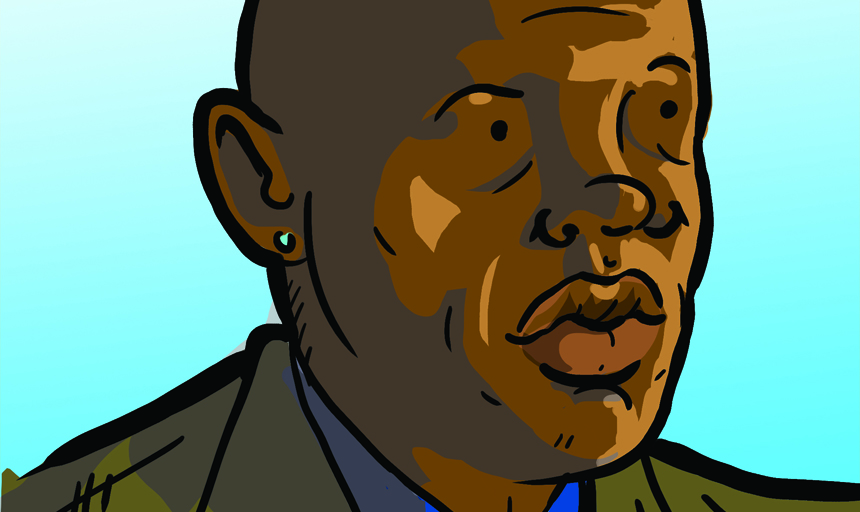Writing with pictures
December 04, 2014

UPDATE: In recognition of Black History Month, Joel Gill will visit Roanoke on Feb. 10 to share his experiences writing and gathering historical information for "Strange Fruit: Uncelebrated Narratives from Black History." Gill, who is associate dean of student affairs and chair of the Arts Foundation at New Hampshire Institute of Art, uses his skills as a comic artist to tell obscure stories of nine early civil rights heroes. He retells these stories to reflect the struggles of African Americans to gain liberty and rights.
His visit is co-sponsored by the Harrison Museum of African American Culture in Roanoke. Event information and reservations can be found on the web calendar.
Joel Gill '01 tells the stories of unsung early civil rights heroes in new graphic novel.
From time to time, Roanoke College magazine has included news about alumni who have had books published. But in the past year, the number seemed to swell, as did the variety in literary style and genre. Joel Gill '01 is one of several alumni whose recently released books represent that diversity.
Joel Gill '01 has come full circle from his high school days of loving comic books. With an associate's degree in graphic design from Virginia Western Community College, a B.A. in fine arts from Roanoke College, and an M.F.A. in painting from Boston University, he is now using comic-book style graphic art to tell stories about early African Americans.
"Strange Fruit, Volume 1: Uncelebrated Narratives from Black History," published in June by Fulcrum Publishing, is a collection of nine stories about unsung early civil rights heroes. Gill chose the book's title to reflect the symbolism in "Strange Fruit" - the haunting song protesting racism in America, particularly lynchings - that was performed most famously by Billie Holiday.
"I was trying to say that I was in some ways freed from the fear that my father and grandfather had lived with," explains Gill, who grew up in Southwest Virginia. "I also wanted to convey, however, that because the rope was still there, we still had a ways to go."
Gill, who is associate dean of student affairs and chair of the Arts Foundation at New Hampshire Institute of Art, says he chose his comic book style to illustrate "sometimes great and sometimes tragic" stories "of other people who were also able to cut the rope." The comic illustrations have "the ability to tell stories and to do things that other mediums can't do," he says. "You can do things visually and play with the understanding of symbolism."
The impetus for the book was a comment made by a friend of Gill's from Boston University.
"He said my paintings were trying to tell a story and failing," Gill recalls. He was considering doing a series of paintings about lynchings as a metaphor about him living in the Northeast and being brought up in the South. He found the story of Henry "Box" Brown - a 19th-century Virginia slave who escaped to freedom by shipping himself to Philadelphia abolitionists in a wooden box - and began gathering other obscure stories.
"The stories sort of evolved organically as people would tell me about them. They weren't written for kids, but written because I thought they were interesting." The comic style, he says, was not so much the best way to tell these stories, as it was the best way for him to tell them.
"I had to figure out a way to draw it with dialogue," he says. "I am more successful drawing comics than I was at painting."
The research came in many forms; most of the resources were regional. People passed them down to family or recorded them on paper. He found information in historical societies and even the National Cowboy Hall of Fame - this about Bass Reeves, born a slave in 1838. Reeves became one of the first black deputy U.S. marshals west of the Mississippi River and arrested more than 3,000 criminals. "Bass Reeves: Tales of the Talented Tenth," due out in October of this year, is an extension of that short story.
Gill's collection of stories is also a statement that one month devoted to black history is not enough.
"We talk about the idea that we have Black History Month, Gay Pride Month, etc., but why not be diverse all the time," Gill asks "Ultimately, these stories are American history."
Famed author and Harvard professor Dr. Henry Louis Gates Jr. agreed so much with Gill that he wrote the foreword for the "Strange Fruit" book.
"He told me I was doing the Lord's work, and that was pretty amazing," Gill says. Gates reflects in his foreword, "In his breakthrough graphic novel, gifted artist and storyteller Joel Gill paints for us a different kind of 'Strange Fruit': not the unspeakable crimes against humanity inflicted on black Americans throughout our history, but the unspoken heroes of our past, dangling outside an educational system, which, beyond highlighting the 'greatest hits' of Black History Month, leaves too many children to strive without steeping them in the stories of their ancestors who succeeded against the steepest of odds."
Says Gill of his life up to the present: "You start out doing things, and one thing leads to another. "It's hard to predict. I originally went to school for comics and fell in love with painting. It's just kind of come full circle within the last 10 years."
- Sarah Cox